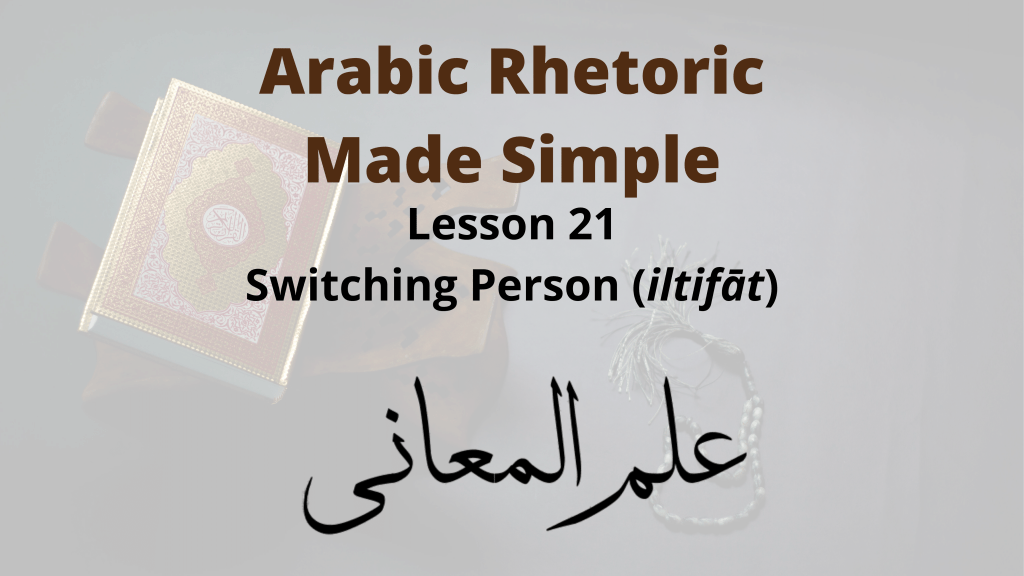In this lesson on balagha we are going to learn about switching between first, second and third person, mid-conversation. Something known as iltifāt (إلتفات).

Table of Contents
Switching Person
The scholars of balagha have a disagreement over exactly what إلتفات is. So we have two definitions for this phenomenon.
- The first definition for iltifāt in Arabic is that, in your conversation you use a person other than the expected person.
- For example: “Your brother was not smart enough to defeat him”. What I mean to say here is: “I was not smart enough to defeat him”. But I replaced the term “I” in first person with the phrase “your brother” in third person. So I have used an unexpected person, and thus I have just done إلتفات.
- The second definition is to refer to something in one person and then to unexpectedly refer to that same thing in a different person.
- For example: “I debated with him but his arguments were too clever for your brother to defeat”. First, I referred to myself as “I” in first person, but then I referred to myself again as “your brother”, in third person. I unexpectedly switch persons on you mid-conversation. So I have done iltifāt.
Notice that the second definition of إلتفات is actually just a special case of the first. The first definition says that you use an unexpected person. The second says that you use an unexpected person after already having used another one. So the second is therefore a specific case of the first.
Examples of iltifāt
Let’s take a look at some examples
The first is part of a poem by the famous poet Imru’ al-Qais:

By saying “your night” he actually means “my night”. Notice he refers to himself in the second person by saying “your” night, when we expect him to say “my” night, in first person. So the poet has done إلتفات, according to the first definition.
Our second example is from Surah Al-Kawthar. Allah says:

Allah started by speaking in the first person by saying “We”, but then He unexpectedly switched to the third person by saying: “Worship your Lord”, when you would expect Him to say “Worship Me”. Allah has done إلتفات according to both definitions.
How iltifāt Relates to Using Nouns in Place of Pronouns
Just a side note, it is important not to get confused between إلتفات and what we learned in the previous lesson about using a pronoun in the place of a noun and vice versa.
With وضع المضمر موضع المظهر and وضع المظهر موضع المضمر, we were switching between parts of speech (nouns and pronouns). But with إلتفات we are switching between persons (first, second and third).
And yes, if you switch both, naturally both lessons will apply. Such is the case withإِنَّا أَعْطَيْنَا…. First Allah uses إِنَّا, a pronoun, and so we expect him to use a pronoun again: فَصَلِّ لَنَا, but He uses a noun: فَصَلِّ لِرَبِّكَ. So this is وضع المظهر موضع المضمر. But also Allah first uses a pronoun إنّا, which is in first person, so we expect Him to continue in the first person: فَصَلِّ لَنَا. But He switches to the third person: فَصَلِّ لِرَبِّكَ.
Purpose of Switching Person
So what is the point of unexpectedly switching persons in mid-conversation?
There is one general reason that applies in all cases of إلتفات, which is that when you unexpectedly change persons, in a sense you renew the speech in a conversation and you re-grab the attention of your listener. But there are also more specific purposes for إلتفات that change from example to example, and depend on your specific situation.
Let’s take a look at one example and analyse part of its beauty.
Specific Example of iltifāt from the Quran
Allah says in Surah Yaseen, quoting Eesa (peace be upon him):

So Eesa (peace be upon) addresses the disbelievers by saying: “What is wrong with me that I do not worship Allah…”. Obviously Eesa (peace be upon him) does worship Allah but it is the people that he is talking to that don’t. So right away this first person speech is unexpected, and therefore you have إلتفات according to the first definition.
Then Eesa (peace be upon him) says: “… whereas you will be returned to Him”.
So although Eesa (peace be upon him) unexpectedly started off with the first person, now we would expect him to at least continue with that. But he switches in mid-sentence to the second person, so this is another إلتفات. This time according to both definitions.
Based on the general purpose of إلتفات, the unexpected reference to himself at the beginning allows Eesa (peace be upon) to grab the disbeliever’s attention. Have them concentrate and focus on what he is saying. Plus, the sudden switch near the end allows him to have the disbelievers renew their attention right when he is telling them about the fact that they will return to their Creator.
But like we learned, some deeper beauty comes from the specific usage of إلتفات in this specific example.
For example, in this case Eesa (peace be upon him) starts off by saying: “What is wrong with me that I don’t worship Allah”, whereas we expect him to say: “What is wrong with you that you do not worship Allah”. By doing this, Eesa (peace be upon him) is showing that the disbelievers not worshiping Allah, and the consequences thereof, are the same whether they apply to the disbelievers or whether they apply to him (peace be upon him). Thus, he is showing how much he cares for them and that their destruction is his destruction. This empathy gives him a better chance to get through to them. SubhanAllah!
- Proceed to next lesson: Intentional Misinterpretation (تلقي المخاطب بما لا يترقب)
- Return to index page: Intro to Ilm Ul-Ma’ani
- Start free lessons: Sign Up for Free Mini-class